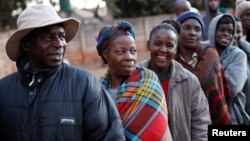WASHINGTON DC - Results of an independent survey of Zimbabwean voters show that opposition leader Nelson Chamisa of the Citizens Coalition for Change (CCC) will defeat the incumbent president, Emmerson Mnangagwa, obtaining an outright majority of votes in elections scheduled for later this year.
The survey was conducted for The Brenthurst Foundation by the London-based SABI Strategy Group, which is not affiliated with a Zimbabwean party.
The survey, conducted in January using an in-depth 15-minute questionnaire, shows Chamisa would win 53% of the vote to Mnangagwa’s 40% among those who say they will definitely vote.
The result of the survey, were posted on The Brenthurst Foundation’s website.
The foundation says this is more evidence of the sliding dominance of “liberation” parties as economic growth in the region lags behind the rest of the developing world — and much of Africa.
While switching support in substantial numbers away from Zanu-PF, many voters expressed concern about whether the election would be free and fair. Some 47% of voters believe the 2023 election will not be free and fair compared with just 38% who say it will be.
“Cheating in the counting process” was cited as the biggest threat to a free and fair election (41%), with “the government abusing its power” cited by 29% and “security force violence” cited by 21%.
The survey also showed that Chamisa’s CCC party is set to win the parliamentary election, outperforming Zanu-PF, which has held power for 43 years since independence in 1980.
When asked, “Thinking ahead to the next general election, which party will you cast your vote for?”, 52% said they would vote for the CCC, while only 40% said Zanu-PF.
About 42% of survey respondents said they had voted for Zanu-PF in 2018, with 40% saying they had voted for the CCC’s predecessor, the MDC Alliance, suggesting a sea change in voter sentiment as Zimbabwe’s economic collapse accelerates under Mnangagwa.
Asked why they were shifting their support, voters cited weak leadership, corruption, bad policies and future prospects as the main reasons.
Chamisa emerged as the public figure with the highest favourability score, of 59%, while Mnangagwa trailed with 43%, narrowly ahead of CCC MP and former MDC finance minister Tendai Biti.
When it came to political parties, the CCC enjoyed a net favourability (subtracting negative ratings from positive ratings) of 31%, way ahead of Zanu-PF’s -4%.
More voters believed the CCC would govern more effectively, with 47% favouring the opposition party as against 33% favouring Zanu-PF.
But Mr Mnangagwa’s party is dismissing the survey saying it was done and funded by governments that want to see regime change in Zimbabwe.
Chamisa formed the CCC following a dispute with Douglas Mwonzora over the ownership of MDC Alliance. Mwonzora is a former member of the opposition Movement for Democratic Change once led by the late Morgan Tsvangirai.




